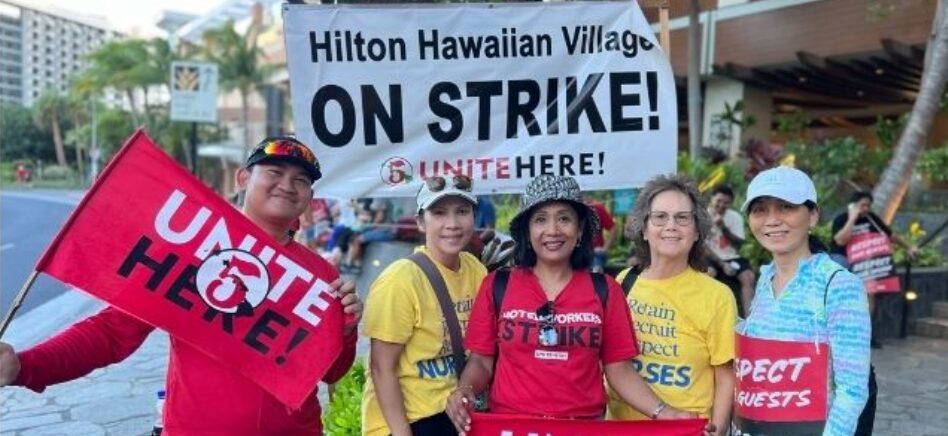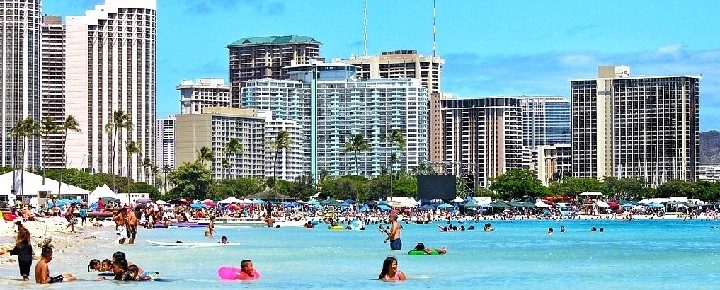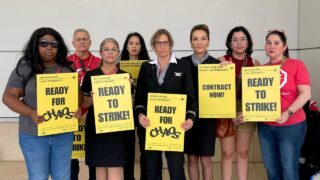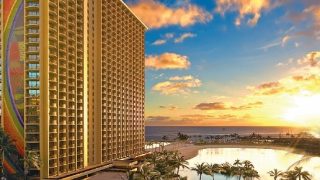As Hawaii’s hotel workers continue their indefinite strike, visitors face major disruptions at the island’s largest and arguably most popular resort, Hilton Hawaiian Village Waikiki Beach Resort. The strike started over Labor Day weekend and resumed on September 24. It has significantly impacted the guest experience.
There is reported to be no progress in negotiations, setting the stage for a very prolonged fight. If you’re planning a trip to Hawaii, it’s essential to stay informed about this ongoing and fluid situation and consider alternative accommodations to ensure a stress-free vacation.
What’s happening at the striking Hilton Hawaiian Village Resort.
The strike, led by hotel workers demanding better wages and improved working conditions, initially affected multiple large chain hotels in Hawaii but is now concentrated at the Hilton Hawaiian Village Resort. With nearly 2,000 employees impacted, the strike has caused significant disruptions for guests. Visitors report substandard conditions, including closed amenities, unclean facilities, and a sharp reduction in services.
A frequent concern among guests is that they were not notified of the strike in advance, leaving them unprepared for the challenges they encountered upon arrival. Many express that, had they known about the strike beforehand, they would have chosen alternative accommodations.
“The pool bars and restaurants are closed, trash and wet used towels are piling up in the hallways, and we have to scrounge for basic items like toilet paper, towels, and clean linens.”
Frustrated guest at Hilton Hawaiian Village
Why you should think twice before booking.
Diminished guest experiences are a frequent complaint. From dirty hallways to unresponsive customer service, the effects of the strike are impossible to ignore. Guests report long waits for essential services like fresh towels and housekeeping, which are typically handled promptly. In some cases, hotel amenities, such as pools and restaurants, are either closed or poorly maintained, significantly altering what is expected to be a relaxing Hawaii vacation experience.
Noise and disruptions have also been issues. Picket lines have been loud and persistent, often starting as early as 6 a.m. and lasting until late at night.
The relentless noise from bullhorns, chanting, and sirens has caused sleepless nights for both tourists and local residents. One nearby resident shared, “The strikers start yelling at 6 a.m. and don’t stop until 10 p.m. We can’t even enjoy our home.”


Guests describe a stressful atmosphere at the hotel, with minimal communication from management. Many visitors express disappointment that the strike wasn’t disclosed before their stay, leaving them to navigate these significant issues after check-in.
Limited services are another major concern. With workers on strike, guests report having to clean their own rooms and deal with overflowing trash bins, among other inconveniences. One guest mentioned, “Housekeeping didn’t change the linens for a week,” while others noted the closure of hotel restaurants and bars, further diminishing their vacation experience.
Extended Impact on adjacent areas: The strike is affecting not just hotel guests but also residents due to parking congestion in the area. This detail underscores the broader ripple effect of the strike beyond the hotel itself.
Guest staging protests?: Some guests are reportedly now staging their own protests in the hotel lobby due to a lack of basic services, adding more strain to the guest experience. The hotel is said to be very slow in its response to complaints.
There are also ethical considerations. For some visitors, crossing a picket line may conflict with their personal values. The strike has brought attention to significant labor issues, with workers fighting for a living wage. As one former hotel worker explained, “The employees are just doing what they need to do to survive. They’re not striking to be spiteful toward visitors; they want what is fair.”
Alternatives: where to stay instead.
As of now, the ongoing strike is affecting the Hilton Hawaiian Village Resort, but it previously impacted seven other Hawaii hotels over Labor Day, and more disruptions could occur. Fortunately, many smaller, locally owned hotels, resorts, and vacation rentals remain unaffected. These alternatives offer a more peaceful stay and a more reliable and expected vacation experience.
How to protect your Hawaii vacation.
If you’ve already booked a stay at the Hilton Hawaii Village, you can take steps to protect your trip. Start by checking your cancellation policy. Some guests can cancel and rebook at other properties without penalty. If your hotel hasn’t informed you of the strike, you may be able to argue for a refund based on the poor conditions.
Another option is to contact your credit card company. In cases where management has been unresponsive or unwilling to accommodate cancellations, contacting your credit card provider to dispute charges may be worth considering.
While the allure of the world’s largest Hilton and the largest hotel in Hawaii, the Hilton Hawaiian Village, is strong, the ongoing strike creates an environment falling far short of travelers’ expectations. To avoid a stressful and noisy vacation, consider staying at hotels unaffected by the strike and supporting transparent and fair properties for guests and employees. We want your Hawaiian getaway to be a time for relaxation and rejuvenation—not frustration.
Have you been affected by the strike during your stay? Please share your experiences in the comments below!
Get Breaking Hawaii Travel News






